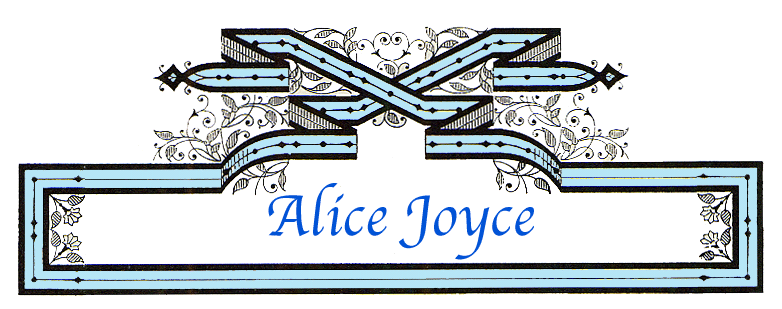

Dancing Mothers (1926) Famous Players-Lasky. Distributor: Paramount Pictures. Presenters: Adolph Zukor, Jesse L. Lasky. Director: Herbert Brenon. Scenario: Forrest Halsey. Photography: J. Roy Hunt. Art Director: Julian Boone Fleming. Gowns by Lucile, Ltd. Cast: Alice Joyce, Conway Tearle, Clara Bow, Donald Keith, Dorothy Cumming, Elsie Lawson, Norman Trevor. 8 reels, 7,169 ft.
This film survives only in a five-reel Kodascope cutdown, which is available on video, and also at the Library of Congress (16 mm.) and the UCLA Film and Television Archives (tinted, 16mm.) Though not a big success in its own day, it is now Joyce's most easily accessible film. It is also quite popular among both silent film fans and scholars, its untraditional conclusion being more in line with modern sensibilities. Note how uncomfortable the contemporary reviewers were about the ending. Interestingly, her earlier film, Daddy's Gone a-Hunting, disappointed reviewers when the conventional road was taken.
| Mom enjoys reading about her life before her marriage |
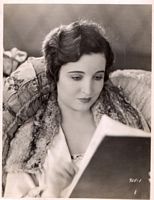 |
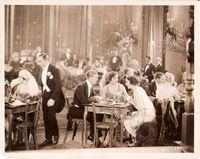 |
Mom enjoys a rare night out. |
| Joyce and Conway Tearle have a serious conversation. |
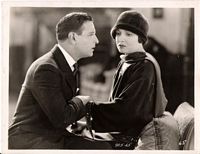 |
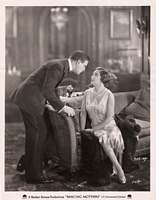 |
More than one apparently. |
| Thanks to Derek Boothroyd for the above pictures. Click thumbnails for larger images |
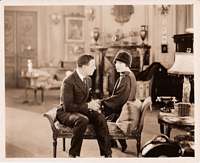 |
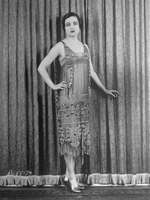 |
A fashion photo from Dancing Mothers, thanks to Jane of the Historical Ziegfeld site. |
| From Derek Boothroyd, a still which appeared in Cine-Miroir. Note the same dress as in the above photo. |
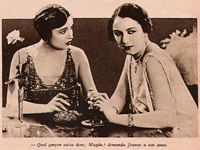 |
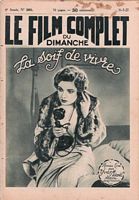 |
From Derek again, this is part 1 of a two part French short story adaptation. |
Famous Players production of the stage play by Edgar Selwyn and Edmund Goulding. Directed by Herbert Brenon and the screen play written by Forrest Halsey. Conway Tearle, Alice Joyce and Clara Bow featured. Reviewed at the Rivoli, New York, Feb. 14. Running time, 71 minutes.
| Ethel Westcourt | Alice Joyce |
| Jerry Naughton | Conway Tearle |
| "Kittens" Westcourt | Clara Bow |
| Kenneth Cobb | Donald Keith |
| Mrs. Massarena | Dorothy Cumming |
| Irma | Elsie Lawson |
| Hugh Westcourt | Norman Trevor |
F.P. isn't quite sure whether the ending they're using on "Dancing Mothers," wherein the mother gets wise to herself and walks out on her selfish husband and daughter is the right one. So the Rivoli programs carry one of those coupons asking for an audience expression of opinion--the alternative ending probably being that the wife forgives them all and comes back to take up where she left off.
In plot this is the old one about the mother who put on her vamping clothes to get the man with whom her daughter was in love--to get him and throw him over, as a protective measure for the kid. But the mother, who had patiently sat by the fireside for years while her husband and daughter went the wild pace of the day, fell for the man who "threatened" her daughter and the ultimate view shows the mother preparing for an ocean voyage with him. As an excuse for her desertion of her rooster and chick, the plot harps heavily on the point that the father and daughter though only in terms of themselves and their reason for wanting her to stay was to make their own easy lives easier.
"Dancing Mothers" is a well produced, beautifully played and generally good picture which has one bad feature--and that almost ruinous. It has an anti-climax which makes the concluding episodes seem long and weary. The point of the story is whether the mother really falls for the man she hoped to trick--or whether she resists him. It is quite clear that she falls, and after she does there is a flock of pleading, of subtitles and other choice bits of whatnot to delay the action, which will bring the whole thing to a finish. So for the regular audiences outside the bigger towns, the alternate happy ending and some heavy cutting on the last two reels would seem the solution of the problem.
Alice Joyce runs away with the film. As the mother she is beautiful and attractively gowned in every scene, while her affair is handled nicely by the director. Conway Tearle is okeh as the handsome lover, the only trouble with him is that his makeup worked itself into some creases on the neck.
Clara Bow is the flapper daughter and she appears to greater advantage than at any time since "Down to the Sea in Ships." Somebody has told her to quit trying to make everybody believe she's a great actress and just be herself, for the dark makeup on the eyes is out--the artificial emoting stuff is canned and her performance generally is the excellent result of an excellent director. Norman Trevor is good as the perplexed father, while Dorothy Cumming, as a friend of the wife, gives what she gives to any picture--a good performance.
"Dancing Mothers" should get over because the scenery, up to that anti-climax, is tight and well knot, and with a possible alternate ending, it would seem that a recutting of the film might turn the trick..
"Dancing Mothers"--Paramount
Herbert Brenon Production with Clara Bow and Alice Joyce Built Around a Jazz Theme
Reviewed by Epes W. Sargent.
| Ethel Westcourt | Alice Joyce |
| Jerry Naughton | Conway Tearle |
| Kittens Westcourt | Clara Bow |
| Kenneth Cobb | Donald Keith |
| Mrs. Massarene | Dorothy Cumming |
| Irma | Elsie Lawson |
| Hugh Westcourt | Norman Trevor |
Based on a play by Edgar Selwyn and Edmund Goulding.
Scenario by Forrest Halsey.
Directed by Herbert Brenon.
HERBERT BRENON and his assistant have been largely instrumental in saving "Dancing Mothers' from being "just another of those things" in that they take the familiar theme of jazz-mad family and give it as semblance of novelty.
The story is pretty much the same--the ultra-modern daughter and the hermit mother who comes back into gay life to save the youngster, but there is an abundance of comedy, much of it perfunctory, as the old telephone booth situation, but it is all amusing, and well handled, and it will please those to whom this type of story has always made an appeal.
On their own behalf the authors of the stage play have worked toward an interesting situation that is left unsolved at the fadeout. The mother has come to love the man from whom she sought to save her daughter. Her husband, whose own hands are far from being morally clean, gives her her freedom and then begs her to return. The woman refuses and goes abroad to seek forgetfulness. You are at liberty to use your own judgment as to whether or no she eventually marries again.
This may not appeal to those who demand the definitely happy ending, but it avoids cluttering up the story with a lot of trite commonplace that goes beyond the climax. Artistically this is by far the better ending.
Alice Joyce and Clara Bow share the honors. In her frivolous moments Miss Bow overplays, sometimes far too much, but she comes soundly through the big scene. She does surprisingly well in the dramatic moment, but as the flapper she flaps too much. Miss Joyce plays with admirable command of the situation.
Conway Tearle is wasted in a negative type of character. He plays sincerely a role that does not always ring true, but he is given no great opportunity. Norman Trevor handles tactfully another thankless role.
The production has been sumptuously made and rural audiences in particular will revel in the sequences in the two night clubs, particularly the first episode in the pirate's den.
"Dancing Mothers" comes too late to gain distinction, but in spite of the sameness of the theme, it stands well above the average in its class both pictorially and in plot-interest.
People come to this film to see Clara Bow, but leave impressed with Alice Joyce. Bow is, of course, a whirlwind of uninhibited energy, but Joyce's quiet presence keeps Bow from running away with the film. Her role is noted by modern critics as one of the more liberated female characters of 20's Hollywood cinema. Joyce declines to engage in big scenes. She seem simply to observe quietly, suffer quietly, and quietly take action. She gives the character an intelligence and a self-possessed quality that makes her decision to leave her selfish family believable without histrionics (she leaves those to Bow, whose character in the film it suits). How welcome it is to finally see a Hollywood film where a wife doesn't sacrifice all for her unworthy husband and child. As Anthony Slide points out in Silent Stars: "There is an inner repose here that no mere male can disturb. Just as her character in The Home Maker, has no problem becoming a successful wage earner, in Dancing Mothers, she will have no difficulty establishing a new life in Europe." As the film was originally about two reels longer than the surviving Kodascope, it is likely that many scenes of character development were eliminated, which would have added to the characterizations, but the best parts of the film are there, and it is still a very fine and unusual film.
This film is available from Grapevine Video, as well as other public domain video companies. The print is not very good, a bit soft and very worn. The compiled score of various orchestral recordings is adequate, and the film runs 64 min.
More information on this film can be found in the following sources:
Higashi, Sumiko, Virgins, Vamps and Flappers. Montreal: Eden Press, c1978, p. 160-162.
Magill, Frank N., ed., Magills Survey of Cinema: Silent Films. Englewood Cliffs, N.J.: Salem Press, c1982
Last revised April 20, 2024